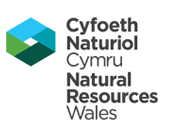Natural Resources Wales
| Cyfoeth Naturiol Cymru | |
 | |
| Welsh Government Sponsored Body overview | |
|---|---|
| Formed | 1 April 2013 |
| Preceding agencies | |
| Jurisdiction | Welsh Government |
| Headquarters |
Tŷ Cambria, Newport Road, Cardiff 51°29′04″N 3°10′02″W / 51.4845°N 3.1671°WCoordinates: 51°29′04″N 3°10′02″W / 51.4845°N 3.1671°W |
| Employees | 1,900 |
| Annual budget | £180 million GBP |
| Minister responsible |
|
| Welsh Government Sponsored Body executives | |
| Website |
naturalresources |
| Map | |
|
Natural Resources Wales is responsible for environmental protection & regulation and the maintenance of natural resources throughout Wales | |
Natural Resources Wales (Welsh: Cyfoeth Naturiol Cymru) is a Welsh Government sponsored body, which became operational from 1 April 2013,[3] when it took over the management of the natural resources of Wales.[4] It was formed from a merger of the Countryside Council for Wales, Environment Agency Wales, and the Forestry Commission Wales, and also assumes some other roles formerly taken by Welsh Government.[4]
Merger debate
As a justification for the merger, the Welsh Government claimed that the new body would produce savings of £158 million over ten years.[5] Whilst the three agencies were broadly supportive of the move,[5] the board appointed by Environment minister John Griffiths did not include any representatives from the forestry sector,[6] and Forestry Commission Wales chairman Jon Owen Jones - the former Welsh Labour MP for Cardiff Central - raised concerns that the forestry industry's voice would not be adequately heard in the new organisation.[7]
Regulatory functions
Natural Resources Wales is responsible for over forty different types of regulatory regime, having inherited these roles from its predecessor organisations. They include:[8]
- consents and assents for sites of special scientific interest
- radioactive substances (both nuclear and non-nuclear)
- licensing of species protected under European law
- marine licensing
- licensing of tree felling
- surface water & groundwater discharges
- water abstraction and impoundment (and drought measures)
- packaging regulations and EU/UK trading schemes
- commercial fisheries of eels, salmon and shellfish
- access restrictions and designation and review of open access land under the Countryside and Rights of Way Act 2000
- major industry (refineries, chemicals, cement, power stations, iron and steel, food and drink etc.)
- waste industry (storage, treatment, disposal)
References
- ↑ "Environment body chairman promises efficient service". BBC News. 1 August 2012. Retrieved 25 October 2012.
- ↑ "Chief executive named for merged environmental body". BBC News. 6 October 2012. Retrieved 25 October 2012.
- ↑ "Timetable". Welsh Government. Retrieved 25 October 2012.
- 1 2 "Single Body". Welsh Government. Retrieved 25 October 2012.
- 1 2 "One environment body will save £158m - Welsh government". BBC News. 29 November 2011. Retrieved 25 October 2012.
- ↑ http://www.walesonline.co.uk/news/wales-news/jon-owen-jones-kept-board-2022729
- ↑ "Forestry concern as minister names natural resources body". BBC News. 25 October 2012. Retrieved 25 October 2012.
- ↑ Natural Resources Wales / Regulatory responsibilities
